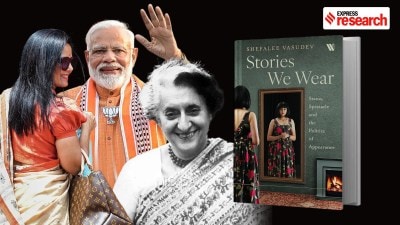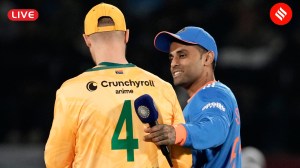West out, Bharat in: Revamped Class 6 NCERT English textbook has ‘Made in India’ content
In contrast, the old book had eight poems, seven of which were by non-Indian authors; and eight prose pieces, five of which were by non-Indian authors and set outside India.
 Further, Bharat makes an appearance for the first time in the chapter titled "Culture and Tradition," and is used interchangeably with India. In fact, Bharat is mentioned 19 times, whereas India is mentioned seven times in the same chapter.
Further, Bharat makes an appearance for the first time in the chapter titled "Culture and Tradition," and is used interchangeably with India. In fact, Bharat is mentioned 19 times, whereas India is mentioned seven times in the same chapter.The new English language textbook for Class 6 titled ‘Poorvi’, among the first to be developed by NCERT in line with the National Curriculum Framework (NCF) 2023, has a revamped content with most chapters rooted in an Indian context, with references to Indian culture, tradition, and ancient knowledge.
While the old book had stories by non-Indian authors featuring non-Indian characters – “Patrick,” “Ms Beam” for example — the new textbook, except for five poems by non-Indian authors, has most of its content, which included nine prose pieces, situated in Indian settings with Indian characters.
In contrast, the old book had eight poems, seven of which were by non-Indian authors; and eight prose pieces, five of which were by non-Indian authors and set outside India.
This is ostensibly in line with the new National Education Policy 2020, which calls for a curriculum to be “rooted in the Indian and local context and ethos.” So pieces by Western authors have made way for one by Sudha Murthy about Rama Natha, the son of a rich landlord obsessed with the idea of a magic potion, and one by S.I. Farooqui about a child named Amber talking to a neem tree. There’s also a chapter on ‘Health and Wellness’ with a three-page section on yoga and its benefits.
Further, Bharat makes an appearance for the first time in the chapter titled “Culture and Tradition,” and is used interchangeably with India. In fact, Bharat is mentioned 19 times, whereas India is mentioned seven times in the same chapter.
A section in this chapter titled ‘Hamara Bharat, Incredible India!’ begins with a seven-sentence passage that refers to India only as ‘Bharat’ – “Bharat has been known worldwide as a land of wise and heroic individuals…All these elements ensure that Bharat prospers and is respected globally.”
In the Chapter titled “Nurturing Nature,” a section on ‘Spices that Heal Us’ speaks of uses of spices other than cooking. It tries to illustrate this through a letter from a grandmother to her grandchildren that details a list of natural cures and “benefits of spices.”
Asked about these changes, an NCERT spokesperson told The Indian Express that the NCF 2023 and the NEP 2020 “have emphasised on connecting learning to the immediate environment of the student so that they can relate learning to their context.”
On the references to Bharat, the spokesperson said: “The first Article of the Constitution of India states that ‘India, that is Bharat, shall be a union of states,’ implicitly codifying India and Bharat as equally official short names for the Republic of India. At the same time, it aims to encourage students to explore India by sharing narratives from different parts of the country.”
The old NCERT English language textbook “Honeysuckle” had eight chapters of which the majority of them were stories by Western authors, It also had the English retelling of a story ‘Fair play’ by Munshi Premchand and the story “Banyan Tree’ by Ruskin Bond.
The NCERT initially aimed to release new textbooks based on the NCF 2023 only for Classes 3 and 6 this year. While textbooks for Class 3 are available in the market, those for Class 6 have been delayed.
In fact, it was only this week that NCERT released new English and Hindi textbooks for Class 6, in the middle of the academic session. Textbooks for the remaining subjects, such as social science, science, and mathematics, are not ready yet, and schools have been asked to teach from a bridge program for Class 6 until then.
These textbooks have been developed under the oversight of a 19-member committee chaired by M. C. Pant, Chancellor, National Institute of Educational Planning and Administration, and included philanthropist and writer Sudha Murty; Bibek Debroy, Chairperson, Economic Advisory Council to the Prime Minister; Chamu Krishna Shastry, founding member of the RSS-affiliated Samskrita Bharati; Manjul Bhargava, Professor, Princeton University; singer Shankar Mahadevan.
- 01
- 02
- 03
- 04
- 05































